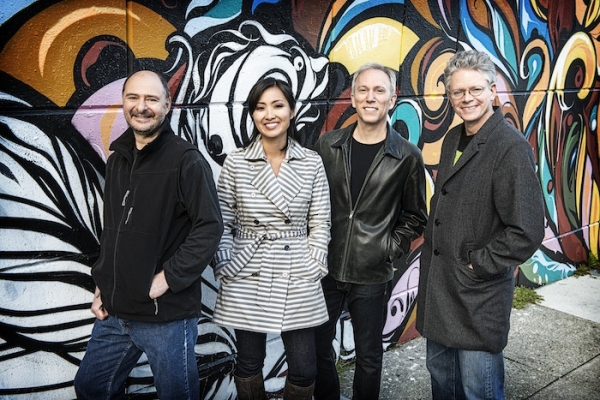New Glass fares best in Kronos Quartet’s wide-roving program
A mostly youthful audience greeted the Kronos Quartet Tuesday night at Bailey Hall on the campus of Broward College in Davie, the ensemble’s first South Florida appearance in many years. Now celebrating its fortieth anniversary, Kronos has enthusiastically championed contemporary music, commissioning over eight hundred works and arrangements—a milestone in the chamber music world.
Kronos likes to rely heavily on electronics, its playing plugged-in as well as blending with pre-taped tracks. At times this can seem gimmicky, an attempt to convert the electronica of rock bands to a string quartet. Still the fusion of tape and chamber ensemble has yielded some significant works, including Steve Reich’s Different Trains, premiered by Kronos during a 1988 contemporary music festival in Miami.
The quartet’s stylistic palette encompasses minimalism, lyrical mysticism, rock and jazz fusion and forays into world music. With such a wide-ranging concentration on contemporary scores from composers of diverse backgrounds, inevitably a Kronos program is going to be uneven.
Tuesday’s concert brought a major new work by Philip Glass and a compelling film score along with a less successful attempt at mixing indigenous folk and classical traditions and failed satire of the Eastern European pop music of a bygone era.
The recently completed String Quartet No. 6 is vintage Glass. Opening with a typically churning theme, the first movement turns wistful through a darkly throbbing viola melody, played with tonal depth and fervent expression by Hank Dutt. A trio of second violin, viola and cello produce the rhapsodic sonorities of the second movement, suggesting Glass’ cinematic scores. Whirling repetitive fragments herald the finale, the instruments’ extremes of range and color exploited to maximum effect, capping a superbly crafted, wonderfully melodic and rhythmic creation. With more judicious amplification, the players gave a fiercely energetic, riveting performance.
A suite from Clint Mansell’s score for director Darren Aronofsky’s 2000 film Requiem for a Dream offered a poignant and haunting soundscape for a drama about self delusion and drug addiction. From the opening expansive cello solo to the blend of taped harp chords and solo violin in the finale, arranger David Lang (of the Bang on a Can composers’ collective) has transformed the material into deeply emotive vignettes that fulfill the dual virtues of brevity and dramatic tension. Cellist Sunny Yang, the group’s newest member having joined Kronos this past summer, played her extended solo with sensitivity, producing a tone more like the darker sonority of a double bass.
Canadian composer Nicole Lizee’s Death to Komische is an attempt to parody East German pop sounds of the 1960’s and 70’s. Blending such forgotten electronic instruments as the stylophone and omnichord into the musical fabric, Lizee aims for irony but the electronically distorted effects often seem gimmicky and pretentious. The score’s best moments come when the players’ eerie tone suggests a Theremin-tinged score for a horror film, complete with the glare of ghostly lighting.
Serbian-born composer Aleksandra Vrebalov’s hold me, neighbor, in this storm combines the taped sound of church bells and native folk singers with live accompaniment. Second violin John Sherba alternated playing percussion and letting out yelps. The problem was that the indigenous singing was livelier and more authentic than anything Vrebalov conceived. An overheated finale resembled Dinicu’s Hora Staccato on steroids.
Guitarist Bryce Dessner’s Aheym (“Homeward” in Yiddish) provided a rock-infused overture of considerable ingenuity. Laurie Anderson’s Flow was an interlude of calm trance music sans amplification.
Encores brought the rollicking Colombian folk tune Yo soy llanero (“I am a plainsman”) and Last Kind Words by 1930’s blues singer-composer Geeshie Wiley, gutsy and catchy as anything ever penned by Fats Waller or Jerry Roll Morton. Violinist David Harrington, Kronos’s founder, played the song with thrust and bluesy sinew.
Posted in Performances
2 Responses to “New Glass fares best in Kronos Quartet’s wide-roving program”
Leave a Comment
Wed Nov 13, 2013
at 10:37 am
2 Comments


Posted Nov 13, 2013 at 6:06 pm by Bob Field
Having been at the concert myself, it is absolutely refreshing to read a review which describes the concert with extreme accuracy. Well done Mr. Budman!
Posted Nov 16, 2013 at 9:41 am by John strass
A great review of a great program.